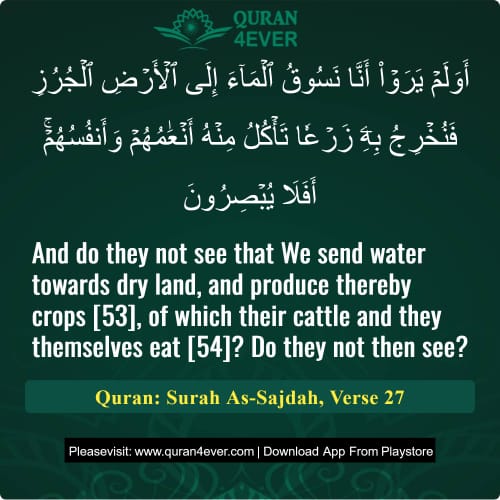
Transliteration:( Awalam yaraw annaa nasooqul maaa'a ilal ardil juruzi fanukhriju bihee zar'an ta'kulu minhu an'aamuhum wa anfusuhum afalaa yubsiroon )
"And do they not see that We send water towards dry land, and produce thereby crops [53], of which their cattle and they themselves eat [54]? Do they not then see?"
This verse points to the revival of barren land through rain, drawing a parallel to resurrection after death.
Just as Allah brings dead earth to life, He will likewise bring the dead back to life.
Reflecting on this natural process should renew their faith in the Resurrection.
From the same earth, Allah produces crops:
Some parts are consumed by humans, such as fruits and grains,
Other parts, such as roots and husks, are devoured by cattle.
This illustrates the perfect and balanced system created by Allah—sustaining all creatures—and highlights His majestic power and wisdom.
The tafsir of Surah Sajdah verse 27 by Ibn Kathir is unavailable here.
Please refer to Surah Sajdah ayat 26 which provides the complete commentary from verse 26 through 27.
(32:27) Have they not seen that We drive water to the parched land, thereby bringing forth crops which they and their cattle eat? Are they unable to see?[40]
40. Keeping the context in view it becomes obvious that this thing has not been mentioned here for the sake of providing an argument for the life-after-death, as generally found in the Quran, but in this context its object is different. This, in fact, contains a subtle allusion to this effect: “Just as a person seeing a barren land cannot imagine that it will ever bloom and swell with vegetation, but a single shower of the rain sent by God changes its color altogether, so is the case with the message of Islam at this juncture. People think that it is not going to gain ground, but a single manifestation of Allah’s power and grace will cause it to gain such glory that people will be amazed at its progress.”

For a faster and smoother experience,
install our mobile app now.
Related Ayat(Verses)/Topics